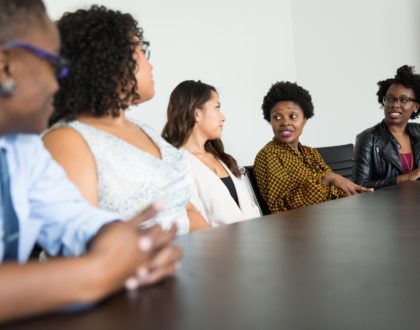How Black and brown Millennials can make their mark in philanthropy post-COVID-19

As the world moves into the new normal, COVID-19 continues to be an experience like no other. It continues to affect various parts of society, including the nonprofit sector. During this time, nonprofits are seeing an overall decline in philanthropic support. For nonprofits, this can be devastating, given that philanthropic support is needed to sustain an organization’s effort and impact. Organizations are beginning to shift their thinking to reach their goals. As organizations start to forecast for the future, now is the time for millennial support, especially millennials of color. As a young Black millennial fundraiser, I want to encourage other Black and brown millennials to take this opportunity to shift the narrative. Now is the opportunity to become bigger changemakers and to start thinking long term about the future and the impact they wish to have in shaping the future.
Millennials are now the largest demographic in the American workforce. Millennials have reshaped the workforce, and there is now an opportunity for this group to reinvent philanthropy. Although millennials are often misconstrued as self-centered, lazy, and unengaged, they are giving back at a higher percentage than their counterparts. The 2014 Millennial Impact Report, released by Achieve and the Case Foundation, reports that 87% of millennials–those aged 20 to 35–gave a financial gift to nonprofits in 2013. According to these findings, as millennials become more financially stable, trends show a steady increase in engagement. Still, the report does not account for this generation’s diverse make-up, which could better inform how nonprofits are choosing to engage.
Nonprofits are starting to acknowledge the potential for influence from millennials, and yet millennials of color remain on the giving sidelines. Black and brown millennials are just as active and engaged in their communities. However, their impact and desire to help shape their communities often go unnoticed.
Moving post-COVID-19, nonprofits will need to think creatively and expand their stewardship strategies, providing black and brown millennials with opportunities for deeper engagement. In turn, millennials of color can now start to think about how they can influence the nonprofit sector and shift the philanthropy landscape.
So, what can Black and brown millennials do to increase their impact post-COVID-19?
- Communicate: As a potential donor, you should communicate with organizations. Become comfortable with sharing why their cause matters to you and how their work comes into play in your community. As a young Black and brown millennial, you are connected to the community through your experiences and those of your families. This is a valued perspective that nonprofits need to hear as they work to create solutions.
- Connect: There is power in numbers. Millennials of color can take action by connecting organizations with additional black and brown millennials and other resources that the organization may not have been able to access. A key takeaway from the Millennial Impact Report is our generation’s ability to connect and influence. Post-COVID-19, organizations will need to fill gaps that have been identified by this crisis, and black and brown millennials’ ability to influence and connect will be much appreciated.
- Have set expectations: Coming out of COVID-19, if there is one lesson society has learned it’s that of understanding, managing, and shifting expectations. Millennials of color should carry these learnings as they deepen their engagement with nonprofits. By having these set expectations, you can hold both yourself and the organization accountable for your values.
- Consistency: One of the most talked-about things regarding millennials is their spending habits. Now is the time to shift that narrative by building out philanthropic practices. Through consistent philanthropic practices, individuals can show nonprofits they are consistent, which can lead to opportunities for more significant impact, such as leadership (board leadership, committee work, etc.). Leadership is one of the top ways black and brown young professionals are looking to engage. And they are not getting a seat at the table because nonprofits want to see consistency. A way for Black and brown millennials to build up consistency with organizations is by becoming either an annual or recurring donor. Nonprofits are aware and most attentive to its most consistent donors-both large and small. Make a gift in an amount that is meaningful to you.
- Engage: For nonprofits to shift their thinking and stop associating philanthropy with being old and white, Black and brown millennials need to engage. Through engagement, nonprofits will be able to learn about what makes engagement meaningful to millennials and start to adjust to accommodate that. With philanthropy historically being associated with the old, white, and extremely wealthy, engagement practices remain targeted towards that demographic.
While we aren’t sure about how the world will be post-COVID-19, black and brown millennials know what their communities need. Making black and brown millennials vital to long-term sustainability for organizations and cause work. The longer millennials of color stay out of the conversation slows down our progress for change in our community.

Written by Dominique Calixte, Associate Director of Annual Giving & Special Events at YW Boston. I am a millennial and fundraising professional. I began my career as an AmeriCorps teaching fellow. I have now worked in the philanthropy space for a little over five years. In my career, I have been able to support nonprofits in building revenue streams. I now have an interest in helping to activate millennials as change-makers through philanthropy.
___________
About YW Boston
As the first YWCA in the nation, YW Boston has been at the forefront of advancing equity for over 150 years. Through our DE&I services—InclusionBoston and LeadBoston—as well as our advocacy work and F.Y.R.E. Initiative, we help individuals and organizations change policies, practices, attitudes, and behaviors with a goal of creating more inclusive environments where women, people of color, and especially women of color can succeed.
